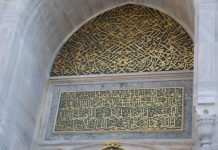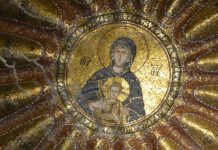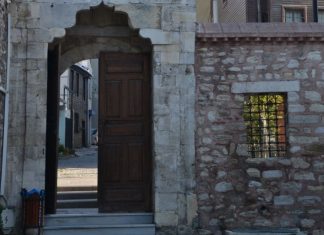He himself at once set out from Constantinople in the month of August in the fourth Indiction, leaving Isaac in the capital to carry on the civil administration. If he heard any seditious talk among their enemies, as would be likely, Isaac was to scatter them,also to guard the palace and the city and try to dissipate the women’s grief. As far as his mother was concerned, she did not require any consoling, I fancy, for she was very strong-minded, besides being so clever in business.
Pacurianus, after reading the letter, appointed Nicholas Branas, a brave man with great military experience, as his lieutenant-general. He himself with his whole army and with the flower of the nobility of the Orestias, started quickly and hurried to join the Emperor.
Immediately the latter arrived, he arranged the whole army in order of battle, apappointed the bravest men leaders of the battalions, and told them to continue the journey in that same order whereever the nature of the ground permitted, so that by understanding the whole arrangement and each man knowing his exact place, they would not become confused in the heat of battle and would not easily or accidentally shift their place. Constantine Opus led the Guards, Antiochus the Macedonians, Alexander Cabasilas the Thessalians, and Taticius, at that time ‘Primicerius,’ [=Chief of the household] the Turks of Achrida. He was extremely brave, and absolutely fearless in battle, although he was not descended from free-born stock; for his father, who was a Saracen, fell into the hands of John Comnenus, my paternal grandfather, on a foraging expedition.
The leaders of the Manichaeans
The leaders of the Manichaeans, who totalled two thousand eight hundred, were Xantas and Culeon, also of the same heresy. All these were very warlike and ever ready to spill their enemies’ blood when opportunity offered, they were moreover audacious and insolent. Of the household troops (generally called “Vestiaritae “) and the Frankish regiments Panoucomites and Constantine Hubertopoulos, so called after his origin, were in command.
Then after arranging his troops in this manner, he set out with all his forces against Robert. On his way he met a man coming from Dyrrachiurn and obtained from him a clearer account of the events there and learnt that Robert had moved up all the engines necessary for a siege and drawn them close up to the walls. George Palaeologus had led a counterattack by day and night, and then in despair had flung open the gates and commenced a fierce battle with the enemy.
He had been severely wounded in various parts of the body, and most seriously by an arrow which had pierced his head near the temple. As he struggled in vain to pull it out he sent for an expert who cut off the end, I mean the tail end which is usually furnished with feathers, and the rest of it he left sticking in the wound. Then with his head bound up as well as possible under the circumstances, he rushed back into the midst of the foe, and continued fighting without flinching until the evening. When the Emperor heard this, he realized that Palaeologus was in need of immediate relief, and therefore marched on at greater speed. On reaching Thessalonica the news about Robert was fully confirmed in detail by several.
Read More about The Roman and Venetian fleets guarded the straits








